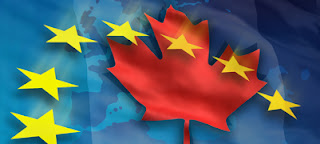Since the start of the American Revolution, Canada has lived in the shadow of the US. At times America has been the enemy, at other times a close ally, Canada’s number one trading partner, the source of waves of immigration and the destination of Canada’s ‘brain drain’. For the entire time though, Canada’s politics have been determined by what they Americans are doing or how the Americans might react. It is time to change that, at least to the extent possible.
The United States is proving to be an unreliable partner. They fluctuate between free trading internationalism and tight bordered isolationists. When Bill Clinton was president, the US eagerly signed NAFTA. Under Bush, the decision to go to war in Iraq under false pretenses in 2003 caused tens of thousands of deaths, contributed to the rise of ISIS and the Syrian refugee crisis. Under Obama, they led the charge to create the Paris Climate Accords. Then, a few years later, they elected Donald Trump and pulled out of the agreement. Trump’s decision to create immigration policies based on race sealed off the border to some Canadians and now they may bring an end to the North American Free Trade Agreement unless Canada agrees to conditions more favorable to the United States. It is almost as if the US is playing an electoral game of good cop, bad cop.
Canada can remain, when possible, America’s neighbor, friend and trading partner while tying its fortune and its culture to Europe.
This may seem counterintuitive because Canada is not in Europe but that is not as important as it sounds.
According to the European Commission, the basic requirements for joining are
- stable institutions guaranteeing democracy, the rule of law, human rights and respect for and protection of minorities;
- a functioning market economy and the capacity to cope with competition and market forces in the EU;
- the ability to take on and implement effectively the obligations of membership, including adherence to the aims of political, economic and monetary union.
Additionally, it states that: “The Treaty on the European Union states that any European country may apply for membership if it respects the democratic values of the EU and is committed to promoting them.”
While Canada is not geographically in the EU, it is certainly a “European country.” At least the country made up of settlers is European; largely of European origin and culturally and politically a descendent of Europe. Additionally, Malta is in Africa and Cyprus is technically in Asia but both are EU countries. So, geography aside it is theoretically possible for Canada to become a member, pending the approval of current EU countries.
Now we come to the biggest hurdle to Canada’s membership and one that absolutely must be addressed; Canada’s First Nations and Metis people. Any contingent of Canadian representatives sent to talk with the EU must include First Nations and Metis representatives and there must be a consensus among Canada’s Indigenous people before any union is agreed to. Even if Canada doesn’t insist on this, it is very likely that Europe will.
The European Union has made multiple statements and adopted clear policies on the rights and treatment of Indigenous people. A list of documents can be found here.
This may benefit Canada’s first nations people tremendously. When settlers first arrived in North America, First Nations people were unable to negotiate. At the very least they negotiated without understanding the extent of the invasion that was to come or the extent to which settlers would ignore any agreements. If terms can be negotiated between Indigenous people, Canada and the EU, Canada’s First Nations and Metis people would find themselves with guaranteed rights, privileges and protections enforceable by an international court.
Assuming such an agreement can be made, it would benefit all sides greatly.
Canada would go from a market of 35 million to a market of about 635 million. Canada’s maritime provinces would boom as the main point of entry and departure for goods and people going between Canada and Europe. Canadian businesses, workers, and students would be free to live, work and play in 28 European countries. Domestically, Canada has an abundance of land and resources and Europe has an abundance of people and capital. It would strengthen Canada and, in light of Brexit and problems since the 2008 financial crisis, it would strengthen the EU.
Who knows, maybe if the reformers ever win out in Russia, Canada could be part of a single market that spans the top of the world.
Canada has always had an uneasy and uneven relationship with the United States but membership in the EU would change that to an extent. Canada is already tied to Europe culturally. We are already a member of NATO and other treaties with the EU and Canadian soldiers lie buried in European soil from two world wars.
We are entering an age when most of our major problems including climate change, ocean pollution, mass migration of people, invasive species, pandemic diseases, terrorism, cybercrime and others are global, not local. None of them can be solved except in cooperation with other countries. Greater international cooperation is the only way any of these, or dozens of other problems will be solved.
We are entering into a future where the brief tenure of the US as the world’s lone superpower will be over. China and India will be global superpowers as will the EU. Canada, left on its own, will be vulnerable to exploitation and intimidation by the US or either of the Asian powers.
Formalizing Canada’s historic ties to Europe in a political and economic bond could easily be of benefit all parties involved immediately and far into the future.
